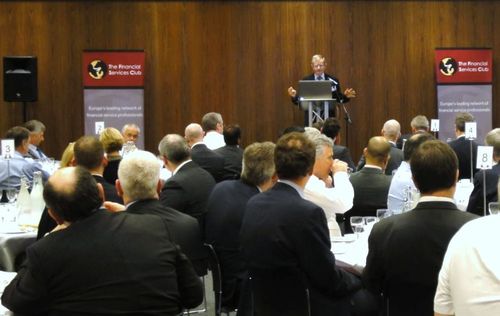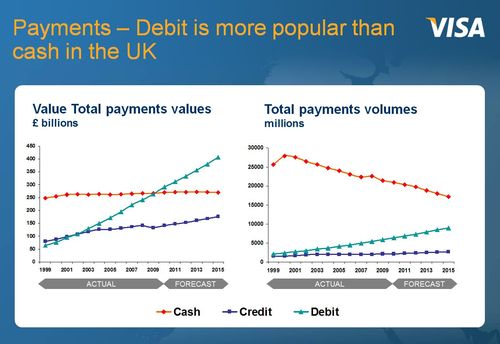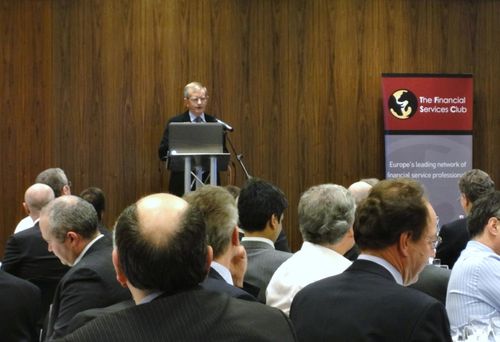
Peter Ayliffe, President and Chief Executive of Visa Europe, presented to the Financial Services Club this week his vision of next generation payments, and how far we could become cashless.

The war on cash is the drumbeat of all card firms, and it was notable that Peter made it clear that he did not believe his competition was American Express and MasterCard, but cash itself.
For example, the proportion of everyday consumer spending at points of sale (POS) across Europe, based upon using Visa cards versus cash, shows that cash is still predominant, with the majority of European countries still heavily dependent upon cash payments at POS.
In fact, 78% of all payments are still cash-based, although what surprised me is that Germany, Switzerland, Italy and Belgium are so heavily oriented towards cash that under 10% of payments are Visa card-based.
Even more surprising is that the UK is one of the top three non-cash based societies, alongside Norway and Iceland (where there is no money!) and above the levels in Finland, Sweden and Denmark.
In a country that keeps beating ourselves up about cash and cheques and being laggards, we’re not.
We’re leaders.
This was reinforced yesterday, when I saw the announcement of Boris Johnson that London would ensure that all public transport systems across London would take contactless payments by the start of the Olympics – a world first.
Not bad for a country that is still trying to get rid of cheques.
Nevertheless, cash is still the issue.
This is demonstrated by one of Peter's slides, which showed that debit is growing rapidly as the focus of payments amongst consumers.

The figures are sourced from UK Payments Association APACS and, to be clear, these figures do not represent total UK payments as it does not include direct debits, cheques and other payments forms but just debit and credit versus cash.
In case you’re wondering, UK cheque volumes dropped from 2,526 million transactions in 2000 to 1,232 million in 2009, whilst their value dropped from £1,885 billion in 2000 to £1,255 billion in 2009. It’s also worth reiterating that we hope to get rid of them by 2018.
So we have the rise of debit cards, the demise of cheques, and the values of cash payments remaining static whilst the volumes decline rapidly.
Peter's presentation then focused upon next generation payments, and specifically contactless and mobile.
Peter began by a chat about contactless in the form of Visa PayWave, saying that the key here is speed, acceptance and security.

People may think contactless is insecure, but it’s more secure than cash.
Lose a few notes from your pocket, and they’re gone.
Lose a contactless card and it’s only good for a maximum of ten taps. At €20 max per tap, that's a maximum of under €200 at risk, and all guaranteed by the bank for reimbursement in many cases.
So the concerns of people about insecurity of contactless are a false concern.
Another key factor is speed.
Contactless is far faster than cash, and Chip & PIN (EMV) for that matter.
A typical contactless payment takes four to six seconds at the POS, versus 12 to 14 seconds for cash and 27 to 44 seconds for EMV or magnetic stripe.
Peter also emphasised the growth of contactless in the UK, and the fact that the Transport for London (TfL) announcement mentioned earlier is a critical moment, as Visa see transit as a “real killer application”.
TfL’s announcement means that Visa contactless will now have acceptance across 8,000 buses, as well as the whole tube and train system, which will normalise the everyday use of contactless.
That means a potential seven million cash transaction from the buses and 160 million cash transactions from the tube is wiped out overnight.
Then in 2012, when the Olympics come to London, Visa – who have are the exclusive payments sponsor of the Games remember – aim to use the games as an accelerator for contactless by embedding it in the everyday habits of London life through the extension of contactless payments to taxis, fast food chains, cinemas and more.
For example, McDonalds will perform a Visa contactless roll out across the UK through 2011.
These movements combined with others means that Visa believes over 60,000 terminals (35% of all POS) and 20 million cards (1 in 5 cards) will be in contactless operation across the UK by the end of the year.
Peter concluded by saying that contactless and cards will, of course, evolve towards the mobile telephone and that mobile will be the future.
This is something I’ve said for a long time, and think it will go one step beyond mobile as it’s not the mobile that’s the focus of all of this, but the chip.
The chip technology will converge over time so that EMV, RFID and SIM chips all become one.
When you can take a chip and stick it anywhere to wirelessly communicate anything, including a payment, then the real next generation of payments will have really arrived.
And maybe, just maybe, by then it will mean just paying with a wave of the hand.
Note: members of the Financial Services Club can get a full copy of Peter's presentation
Chris M Skinner
Chris Skinner is best known as an independent commentator on the financial markets through his blog, TheFinanser.com, as author of the bestselling book Digital Bank, and Chair of the European networking forum the Financial Services Club. He has been voted one of the most influential people in banking by The Financial Brand (as well as one of the best blogs), a FinTech Titan (Next Bank), one of the Fintech Leaders you need to follow (City AM, Deluxe and Jax Finance), as well as one of the Top 40 most influential people in financial technology by the Wall Street Journal's Financial News. To learn more click here...

